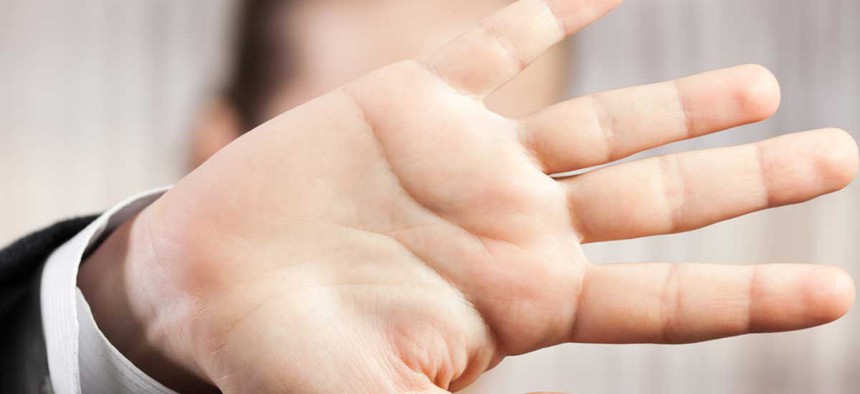
Ilya Andriyanov/Shutterstock.com
Social Psychology Research Shows That We Should Be Less Self-Conscious
It may make you happier and more successful.
Can psychological research change your life? Most of the time, no—findings by psychologists don’t usually bear on everyday concerns. My colleagues at Yale, for instance, study topics such as the neuroscience of memory, how babies reason about social groups, and decision-making in psychopaths. Such studies are intended to explore how the mind works, and while their findings might ultimately make the world a better place—at least this is what we say in our grant proposals—that’s not their immediate focus.
But there are exceptions, and a lot of these come from social psychology. Classic research in this area generates striking—and useful—insights having to do with persuasion, racial bias, personality, romantic attraction, and much more. The studies from social psychology that have most changed my own life concern consciousness and the self.
In an experiment published in 2000, the psychologist Thomas Gilovich and his colleagues asked undergraduates to wear a piece of clothing that they found embarrassing—a t-shirt with a picture of singer-songwriter Barry Manilow on it. After putting on the shirt, the undergraduates had to spend some time in a room with other students and were later asked to guess how many of the other students noticed what they were wearing. The undergraduates tended to overestimate the proportion by a large margin, and did the same when asked to wear a t-shirt with a positive image on it, like Bob Marley or Martin Luther King Jr. In study after study, experimental subjects thought that other people would notice them much more than they actually did.
Gilovich and his colleagues dubbed this the “spotlight effect.” We are naturally conscious of ourselves, what we are thinking, how we look, and what we are doing. As David Foster Wallace put it, “There is no experience you’ve had that you were not at the absolute center of.” And so it’s hard to block the inference that others share this focus. If I’m wearing a ridiculous t-shirt, I’m thinking about it and so I assume that you are too.
Or consider the ups and downs of everyday life. I said something inappropriate at a party last week, and I’m still a bit mortified. Yesterday, I gave a great talk; today is a real bad hair day. This year I worked hard on my introductory psychology class; last year, I phoned it in. Because such contrasts are so salient in our minds, we think others are sensitive to them as well; we think they notice. But research finds that they don’t, at least not to the extent we think they do.
Other experiments explore the illusion of transparency. When asked to lie or hide information, people overestimate how well others can guess the contents of their minds. Again, the spotlight of consciousness is at fault. If I stole the diamonds and put them in my pocket, and then lie and say that I don’t know where they went, I am exceedingly conscious that the diamonds are in my pocket. This intensity of consciousness makes me think that the truth is plain to others. It usually isn’t; we are better liars than we think we are.
One practical message of this research is one of liberation.
When looking back on our lives, we often regret our failures to act, and one reason for these failures is our worry about embarrassment, what others will think of us. Gilovich and his colleagues conclude,
We might take a modest step toward more fulfilling lives, in other words, if we took stock of a few of Abraham Lincoln’s more memorable words and understood that “people will little note, nor long remember” what we say or do. Of course, Lincoln was wrong about his own words and about that speech in particular. But there are precious few Lincolns.
We can combat the spotlight effect by putting ourselves in circumstances that turn down the dial of self-consciousness. As the social psychologist Gustave Le Bon noted in 1895, being in a group can make consciousness of the self partially disappear—“An individual in a crowd is a grain of sand amid other grains of sand, which the wind stirs up at will.” In the wrong circumstances, being part of a crowd can make people do stupid and cruel things. But it can also be a source of great pleasure, as when synchronized movement with others—in a rave, a concert, or a really good Bar Mitzvah—blurs the boundaries of self and other.
You don’t need other people to turn down the dial; this sort of “deindividuation” can be as close as the kitchen or the medicine cabinet. Alcohol and drugs can diminish self-consciousness; this is part of their appeal. You can lose yourself in “flow” experiences where you become totally immersed in an activity, or through certain meditative practices. And, though there hasn’t been research on the topic as far as I know, I can assure you from personal experience that video games also do the trick.
To turn up the dial, to increase your self-consciousness, it helps to put yourself in circumstances where others are observing you. This is common sense, but what’s more surprising is that even being in the presence of simple line drawings of eyes increases the sense of self, and that this can promote good behavior, making people less likely to cheat.
There is a case, then, for increasing our self-consciousness. But it’s not an easy call. Some would argue that escaping from the spotlight not only makes us more spontaneous and less inhibited, but that it also has other positive effects. There is evidence, for instance, that engaging in meditative practices that diminish the focus on the self can make people less biased and more compassionate. We might be better off, in every way, when we succeed in dialing down the experience of being the center of the universe.
(Image via Ilya Andriyanov/Shutterstock.com)






